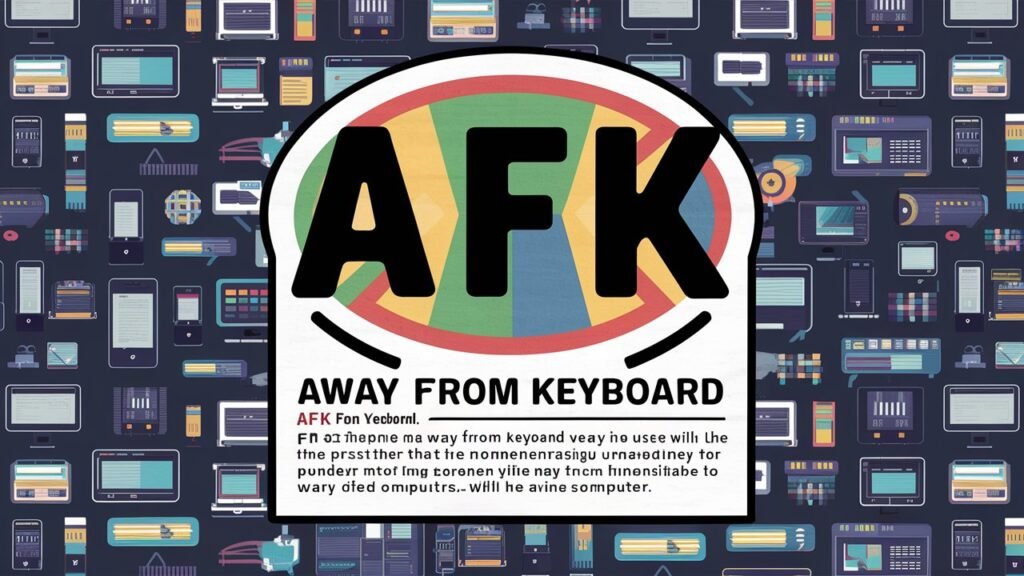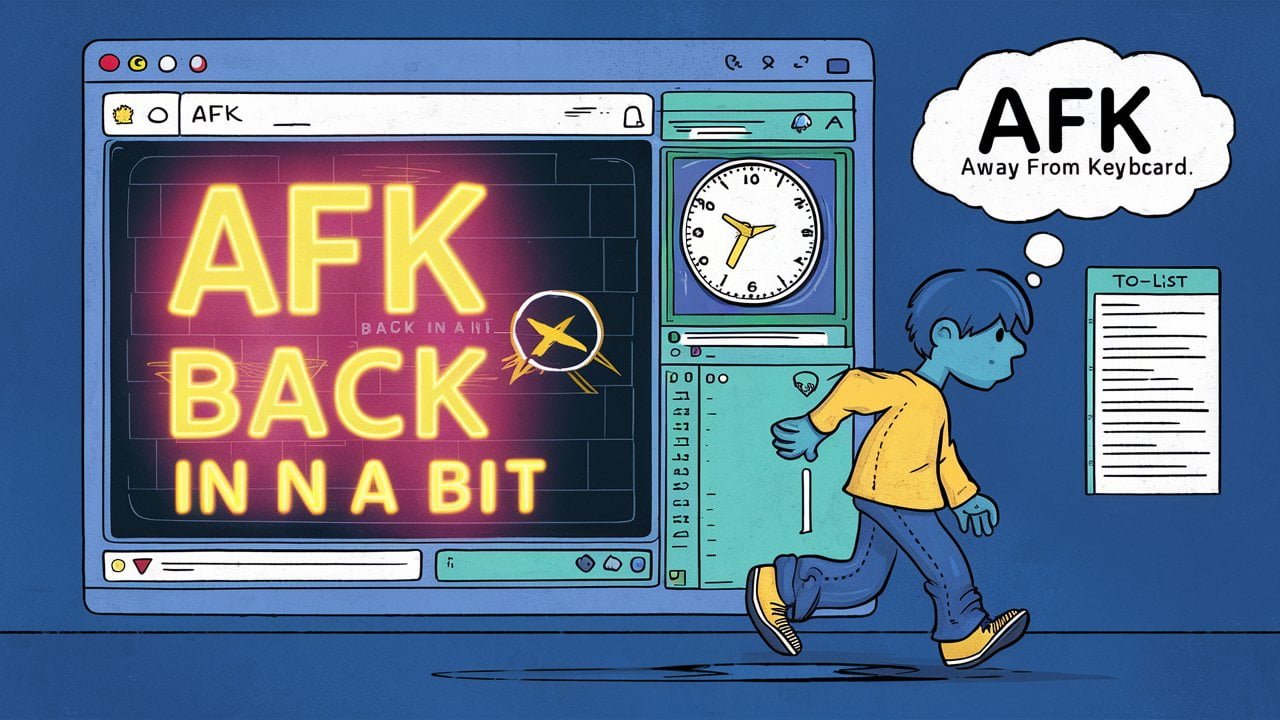In the fast-paced realm of online communication, a simple acronym like “AFK” holds a significant meaning that transcends traditional boundaries. AFK, standing for “Away From Keyboard,” serves as a crucial indicator in virtual conversations, denoting a transient refuge from one’s digital presence while remaining connected to the conversation at hand. This unassuming abbreviation has evolved beyond its gaming roots to become a cornerstone of modern online interactions.
Originating from the immersive world of early online gaming communities, where split-second decisions could mean victory or defeat, AFK emerged as an informative cue for players stepping away momentarily. Its utility extended far beyond gaming circles, permeating social media channels, chat rooms, and messaging apps with equal poise.
Today, AFK stands not just as an indication of physical absence but also as a testament to the ever-evolving lexicon of digital vernacular, shaping the way we navigate virtual landscapes with clarity and efficiency. As users across diverse platforms embrace this linguistic shorthand, the essence of AFK in online dialogue continues to weave a seamless thread connecting individuals at the touch of a key.
Understanding the Origin of AFK.
The term AFK, standing for “Away From Keyboard,” traces its origins back to the early days of online gaming communities. In these virtual realms, where quick coordination and communication are crucial, players needed a concise way to inform others that they were stepping away from their keyboards momentarily.
Imagine a scenario in a multiplayer game where a player needs to take a brief break between intense rounds or missions; using AFK would promptly convey this message without disrupting the gameplay flow for teammates or competitors.
In online gaming environments, teamwork and strategy often hinge on timely responses and actions. Therefore, the introduction of AFK as a standard abbreviation helped streamline interactions within games.
By signaling their temporary absence with AFK, players could ensure that their allies or adversaries were aware of their unavailability during critical moments. This practice not only demonstrated respect for other participants’ time but also fostered a sense of sportsmanship by acknowledging the real-life commitments or interruptions that might affect one’s continuous presence in the game.
Through the evolution of online gaming culture, AFK gradually transcended its initial niche usage and transitioned into broader online communication landscapes. The efficiency and clarity provided by AFK in gaming scenarios resonated with users across various digital platforms beyond just gaming.
As people navigated different chat rooms, forums, or social media spaces, incorporating AFK became a convenient shorthand for communicating temporary unavailability while maintaining connection with others virtually. The simplicity and universality of AFK’s meaning made it easily adaptable to diverse digital contexts, solidifying its place as a ubiquitous term in online conversations.
Significance of AFK in Online Communication.
In the modern landscape of digital communication, the term AFK plays a pivotal role beyond its gaming origins. It has seamlessly transitioned into various online spaces, serving as an efficient way to notify others about one’s temporary unavailability.
Whether actively engaging on social media platforms or participating in lively chat room discussions, individuals find AFK to be a universal indicator that transcends different online environments. By simply typing “AFK,” users can communicate their brief absence without the need for detailed explanations, ensuring smooth and respectful interactions with their online peers.
For social media enthusiasts, incorporating AFK into conversations signifies a courteous gesture towards those they are engaging with virtually. This abbreviation acts as a digital courtesy by instantly conveying the user’s pause in activity, indicating respect for the ongoing conversation or interaction.
Similarly, in bustling chat rooms where real-time conversations unfold rapidly, the utilization of AFK becomes invaluable in maintaining clarity amidst dynamic exchanges. Its widespread adoption underscores its status as a fundamental tool for facilitating seamless communication across diverse digital platforms where brevity is key.
Moreover, the universality of AFK enhances its practicality and ensures that its meaning remains consistent across a myriad of online settings. This standardized usage fosters a sense of community and mutual understanding among internet users worldwide, creating a shared language that transcends geographical boundaries and cultural differences.
As individuals continue to navigate the vast expanse of cyberspace, the ubiquitous presence of AFK stands as a testament to how simple abbreviations can greatly streamline and enhance the efficiency of online interactions while promoting respect and consideration among virtual peers.
Impact of AFK on Online Interactions.
When it comes to online interactions, the impact of using AFK (Away From Keyboard) can be significant. By utilizing AFK appropriately, individuals can effectively manage others’ expectations and communicate their temporary unavailability without causing misunderstandings or disruptions in ongoing conversations.
This simple abbreviation serves as a courtesy gesture that respects the time and attention of others engaging in digital communication platforms. Understanding the etiquette behind when to use AFK is crucial in fostering healthy and respectful communication dynamics in various online settings.
For instance, imagine being part of a group chat where multiple participants are discussing important topics. If someone needs to step away briefly but fails to signal their absence with AFK, it may lead to confusion among the remaining members.
On the other hand, if they conscientiously use AFK before taking a break, everyone else will be aware of their temporary unavailability and adjust their interactions accordingly. This basic consideration not only maintains clarity within the conversation but also demonstrates respect for everyone’s involvement.

In online gaming scenarios, the impact of using AFK extends further into team coordination and strategy execution. In multiplayer games that require collaborative efforts, abruptly going offline without informing teammates through AFK can disrupt gameplay flow and jeopardize the overall gaming experience for all participants.
By adhering to established norms such as signaling one’s absence with AFK before leaving, players contribute to smoother gameplay sessions by ensuring that their team members are informed about any interruptions they might encounter.
Therefore, recognizing the impact of AFK on online interactions goes beyond mere convenience; it reflects an individual’s awareness of how their presence or absence influences group dynamics in digital communication spaces.
Taking a moment to employ this abbreviation thoughtfully can pave the way for more respectful and harmonious exchanges across different online platforms, emphasizing the importance of mutual understanding and consideration in virtual dialogues.
Common Alternatives to AFK.
In addition to the widely recognized “AFK,” online users have at their disposal a variety of other popular alternatives when they need to step away momentarily. One common substitute is “BRB,” short for “Be Right Back.” This abbreviation is often employed in casual online conversations, indicating a temporary absence while assuring others that the individual will return promptly.
For instance, during an intense gaming session with friends, a player might quickly type “BRB” before going AFK briefly to grab a snack or address something urgent.
Another frequently used abbreviation in similar contexts is “GTG,” standing for “Got To Go.” Unlike the more neutral tone of AFK and BRB, GTG typically conveys a sense of urgency or immediacy. When someone types “GTG” in a chat, it usually suggests that they must depart abruptly or without delay.
For example, if participants in an online meeting see a colleague message “GTG,” they understand that the person needs to leave promptly and may not be able to return immediately.
Furthermore, some individuals opt for terms like “TTYL” (Talk To You Later) or “TMI” (Too Much Information) depending on the nature of their departure or communication style. These alternatives provide users with flexibility and allow them to express different nuances within their messages subtly.
For instance, one might use “TTYL” when intending to continue a conversation later but not specify an exact timeframe. The varied options offer individuals room for self-expression and contribute to creating richer interactions across diverse online platforms.
Incorporating AFK into Everyday Digital Conversations.
As the landscape of digital communication transforms rapidly, the integration of ubiquitous abbreviations like AFK plays a pivotal role in enhancing online interactions. By incorporating familiar expressions such as AFK into everyday conversations, individuals can effectively streamline their communication processes across diverse digital platforms.
Whether in online gaming communities, social media interactions, or chat room discussions, employing AFK helps individuals efficiently signal their temporary absence without causing disruptions.
Utilizing well-known abbreviations like AFK not only facilitates smoother communication but also fosters a sense of connection among users who share a common digital language.
For instance, in a fast-paced online multiplayer game, when a player types “AFK for 2 mins” before stepping away from the game temporarily, it sets clear expectations for teammates and showcases respect for everyone’s time and commitment to the gameplay.

This efficient use of AFK showcases how integrating such terms enhances teamwork and cooperation in shared virtual environments.
Moreover, incorporating AFK seamlessly into everyday digital conversations reflects an understanding and awareness of evolving communication trends and norms. When individuals lace their messages with concise terminologies like AFK in casual chats or work emails, they not only save time but also demonstrate adaptability to contemporary modes of interaction.
This subtle inclusion of familiar abbreviations contributes to constructing a more cohesive digital discourse where participants can engage meaningfully without disruptions or confusion due to abrupt absences.
Overall, by embracing commonly-used shortcuts like AFK within various online settings, individuals can navigate the intricacies of modern communication adeptly. Through this adoption of shared linguistic cues like AFK, digital conversations become more fluid, cohesive, and respectful of each participant’s time and presence within the expansive realm of virtual interactions.
Understanding the Importance of AFK Across Online Platforms.
In conclusion, the acronym AFK, originating from online gaming communities to signal a temporary absence, has transcended its initial purpose and now serves as a universally recognized abbreviation in various digital spaces.
From social media interactions to chat rooms, individuals utilize AFK as a simple yet effective way to communicate their unavailability without disrupting ongoing conversations. By adhering to the etiquette associated with using AFK appropriately, users can manage expectations and maintain smooth dialogue within online environments.
As communication methods continue to evolve rapidly in the digital era, incorporating commonly understood terms like AFK into everyday conversations is vital for enhancing efficiency and clarity in online interactions.
Whether connecting with friends on social media or collaborating with colleagues in virtual settings, the seamless integration of AFK facilitates better communication practices by providing transparent signals of availability. In this way, embracing abbreviations such as AFK not only streamlines discussions but also promotes more effective engagement across a wide array of online platforms.




